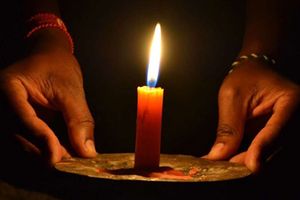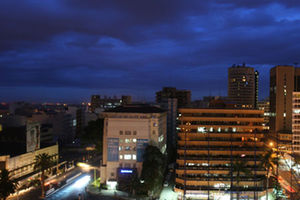Shame of power blackouts costing lives

Babies should never be born in the dark, exposing them to unnecessary risks.
What you need to know:
- Six hours of power interruptions means laundries don’t run, the sterilisation units are dead, the lab is at a standstill and we cannot even feed the poor patients.
- The power disruptions need to stop. It cannot be that a country can be so callous about the lives of its people when they are in their most vulnerable state!
Last week the country was once again embarrassingly tossed into a nationwide power blackout for hours, leaving us in darkness without a care.
The incident raised a social media furore, with Kenyans venting on the inconvenience occasioned. Videos of our ghost airport surfaced, with operations grinding to a halt and travellers depending on light from their cell phones to get around. To say it was a major embarrassment is an understatement.
Larry Madowo voiced his disappointment on X about the state of his country’s airport, immediately attracting hundreds of comments, but one really hit home. In her reply to Larry, Catherine Amayi was appalled at the attention given to the airport situation while no one spoke about the needless loss of life in our health facilities.
A few years back, one of our public facilities came under fire when four babies succumbed in the newborn unit in one night. What wasn’t stated clearly is that these were all the babies in the unit that night. It means that they could have been more mortalities if the nursery had more babies. It was a horrifying experience, heartbreaking for the families that had been robbed of their little angels.
If this scenario is unacceptable, imagine it repeating itself across the country in a space of six hours. In public health facilities, only a small percentage of them have backup generators. Power disruption therefore means that all hospital functions dependent on electricity will be paused. Unfortunately, attempts to save life cannot afford a pause.
Nancy was lying on the table before us, her third caesarian section underway. This was no easy surgery. Her placenta was lying low below the baby, a discovery we just made on the operating table. Nancy’s surgery was scheduled to take place in a week’s time. That was until the baby decided to change plans and Nancy noted mild labour pains. Thankfully she came to the hospital as fast as she could and was immediately wheeled to surgery. It was 11p.m in the night and the shift was in full swing.
Nancy was expeditiously brought to the operating table and we commenced on the delivery. After opening the abdomen, we were left staring at the intricate maze of blood vessels, greatly enlarged due to the abnormally placed placenta, running on the surface of the uterus where I was expected to cut through to get to the baby. The placenta itself was huge and spread out like an octopus. We sent out an urgent SOS to the specialist obstetrician.
As a young doctor on call, trying to figure out what our options were in the safe delivery of the baby and minimising the inevitable haemorrhage, we were plunged into darkness. The sudden power disruption turned the theatre machines off, with alarms blaring from the monitors. We could not see a thing and patiently waited for the backup generator to kick in.
Twenty seconds later we were back in business. The overhead surgical lamps went on and we were galvanised into action. We managed to slice through the placenta and extracted the baby in lightning speed. The baby came out yelling, much to our relief. The placenta on the other hand was bellowing.
Blood was pouring like a river and we did not have the luxury of time. The placenta was quickly manually removed and off we went, attempting to shut the multiple taps pulsating in unison, squirting the crimson life-giving liquid all over. There was pin-drop silence in the room. We could hardly breathe.
Thankfully, we were making progress. The uterus was cooperating and had tightly contracted, tiding the wave. The bleeding slowed down and we were able to inspect the damage. The rest of the uterus was now alright but there was a stubborn artery that was still spewing out blood. Just as we were zeroing in on it, the lights flickered and died as the generator sputtered in the distant background.
We were now wading in the dark, trying to keep needles out of the way to prevent injuries while our patient bled out. The anaesthetist who was always calm and collected was sweating profusely trying to keep his patient alive. The rest of the team was scurrying around trying to find their little phones to use the torches for illumination. There was a lot of shouting going on beyond the double doors. All we heard was that the generator had gone off, probably due to a technical hitch and the maintenance team had no answers so far on whether they could rectify the problem or even within what timelines.
Help wasn’t coming. We had to figure it out. With the help of a flashlight from a trusty Motorolla phone, we struggled until we successfully managed to stop the rogue blood vessel. She finally stopped bleeding and collectively we managed to let out a long-held breathe.
I wouldn’t wish this on any patient, I wouldn’t wish it on any medical team having to make do. Babies should never be born in the dark, exposing them to unnecessary risks; no one should have to die in the intensive care unit because their ventilator was snuffed out; no patient should have to succumb to a heart attack because the defibrillator was dead.
Six hours of power interruptions means laundries don’t run, the sterilisation units are dead, the lab is at a standstill and we cannot even feed the poor patients.
The power disruptions need to stop. It cannot be that a country can be so callous about the lives of its people when they are in their most vulnerable state!
Dr Bosire is an obstetrician/ gynaecologist





